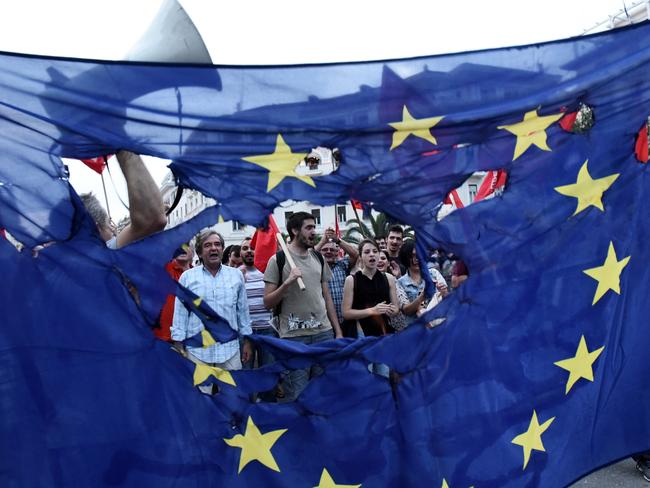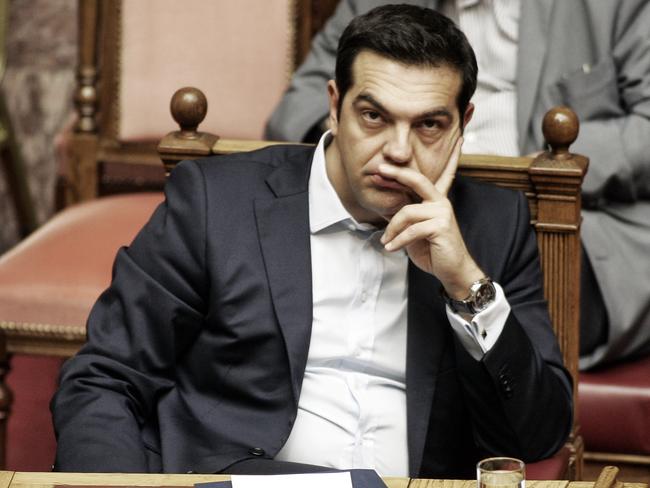Greece on the edge of a banking collapse
GREECE faces a banking collapse as the last of the nation’s ATMs get emptied by panicked citizens and banks are forced to close for at least a week.

GREECE faces a banking collapse as the last of their ATMs get emptied by panicked citizens, banks are forced closed for at least a week, the value of the euro tumbles and share markets slump across Europe.
Emergencies meetings were being held across Europe today notably in Germany which has been called on by European partners to halt the slide of Greece out of the European Union.
The German market was expected to lose as much as 65 billion euro (AUD$94 billion) by Monday with a 4.3 per cent stockmarket slump when markets opened, Italy and Spain also suffering heavy losses on markets and government bonds as was Portugal with a 6.5 per cent slump as investors scramble in anticipation the crisis signals the start of the “Grexit”.

European banking shares plummeted by more than 10 per cent, the London FTSE 100 fell more than 2 per cent all in what has so far been the worst market conditions since 2011.
Greek Prime Minister Alexis Tsipras pleaded for calm as he imposed capital controls to allow only withdrawals of between 40 and 60 euros from the ATMs although by mid afternoon most ATMs had been emptied already anyway.
He assured people their money was safe and while banks would restock ATMs later on Monday they would be limited to the new cap until at least next Tuesday.
The Athens Stock Exchange also announced it would remain closed until July 7 and a block was placed on all monies leaving the country.
The European markets hasn’t yet fully responded since the action took place on the weekend but the value of the euro against other currencies fell between 1.5 and 2 per cent.
AUSSIE EXPAT TELLS: The truth behind Greece’s debt
“We are in uncharted territory, and European equities, like all markets, will have a difficult time processing this,” said Deutsche Bank Managing Director Nick Lawson.

Queues outside petrol stations notably in Athens were already starting to form as people pondered whether other rationings would be created amid a swirl of rumours and confusion.​ Pensioners, many of whom do not traditionally use bank cards and take cash out from the teller, were particularly worried and even though banks were closed, some were still lining up outside some Athenian branches expecting there to be some change of mind. Many businesses have also started to reject credit cards declaring themselves cash only businesses prompting EU governments to warn their tourists citizens embarking this week on summer holidays to carry cash if in Greece.
Despite this, there was not so much panic on the street as there was frustration, fear and trepidation. No-one was sure how to pay rents, buy food and worried whether capital money controls would remain beyond next week.
Greek-Australian café owner in central Athens Constantine Garifallou said he was expecting less customers as the crisis continued but no one knew where this would go.
The father of two said many people were blaming the Germans and or the IMF and did not want to recognise it was an “in-house” long-term problem.

He said many were worried about the “right now” rather than the future, himself included.
“If it all collapses, my (children) have Australian passports already in hindsight if it all goes to s**t and we have a civil war or it gets that desperate you pull the ace out of your sleeve and go back to the Australian passport, it’s something I thought I don’t want that to happen, we’re still doing okay … family, business, kids its here.”
Greece on Tuesday is expected to officially default on its EU loans meaning further loans and funds from the rest of Europe will not be unlocked but Tsipras appealed for an extension until at least July 5 when a snap referendum is to be held to let the people decide whether they want to remain in the euro zone.
Germany’s Angela Merkel was to meet the heads of the parliamentary groups and parties while in France President Francoise Hollande called an “emergency” meeting of his key Cabinet members.
Merkel yesterday spoke with US President Barack Obama to see what can be done to ensure the crisis doesn’t spread.

In a telephone conference call, Obama and Merkel “agreed that it was critically important to make every effort to return to a path that will allow Greece to resume reforms and growth within the eurozone,” the White House said.
Most eyes are looking to after July 5 now and the shock referendum Tsipras called in which he already called on voters against backing a deal that allowed Europe to further “humiliate” Greece.
Greek Finance Minister and dual Greek-Australian national Yanis Varoufakis said on Monday it was up to Merkel to ensure discussions with international creditors remained open.
“The EU leaders must act and among them she, as the representative of the most important country, holds the key in her hand. I hope she uses it,” he told Germany’s Bild newspaper.
He added that Athens was ready for “new proposals by the institutions” – the EU, European Central Bank and International Monetary Fund.
Varoufakis said Athens had called the referendum because it rejected the terms for more bailout money demanded by the creditors.
“We couldn’t agree to the proposal, but we also couldn’t simply reject it, given the importance of the matter for the future of Greece,” he said. “So we decided to turn to the citizens, to explain our negative attitude to it, but to give them the choice.”
Germany’s EU Commissioner Guenther Oettinger said there would nit be new negotiations and it would be the end of the world if Greece left the EU.
“The offer to Greece to stay in the euro zone still stands but if that doesn’t succeed, it wouldn’t be the end of the world,” he said.
He added that if the country did quit the euro zone, it could revamp itself within a decade to such an extent that “a return to the currency union would definitely be possible”.



